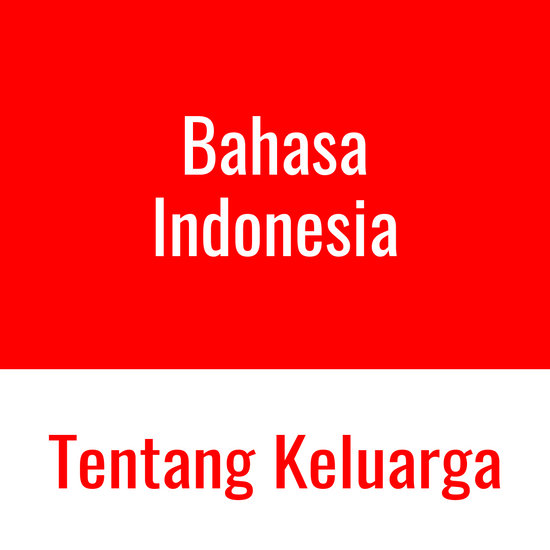Introduction
Family is the most important part of our life from wherever our origin, including Indonesia. Like an Asian culture, that still adheres to the communal system, in Indonesia is not strange if you have already grown up or got married, still, live with your parents, or not every family members leave their parent alone. There is at last one family member staying at parent home to accompany.

Family Words
| English | Indonesian |
|---|---|
| Family | Keluarga |
| Parent | Orang Tua |
| Father | Bapak |
| Mother | Ibu |
| Children | Anak |
| Only Child | Anak Tunggal |
| First Children | Anak Pertama |
| Middle Children | Anak Tengah |
| Last Children | Anak Bungsu |
| Older Brother | Kakak Laki-laki |
| Older Sister | Kakak Perempuan |
| Younger Brother | Adik Laki-laki |
| Younger Sister | Adik Perempuan |
| Great-grandmother | Buyut |
| Grandfather | Kakek |
| Grandmother | Nenek |
| Grandchildren | Cucu |
| Great-grandchildren | Cicit |
| Uncle | Paman |
| Aunty | Tante |
| Nephew | Keponakan |
| Cousin | Sepupu |
| Married | Menikah |
| Father in Law | Bapak Mertua |
| Mother in Law | Ibu Mertua |
| Brother in Law | Ipar Laki-laki |
| Sister in Law | Ipar Perempuan |

Conversation About family
One day John visits Budi's house, then sees Budi's big family picture.
| Spoke Person | English | Indonesian |
|---|---|---|
| John: | So this is your family picture? | Jadi ini adalah foto keluargamu |
| Budi: | Yes, from my father's side family. | Ya, dari sisi keluarga bapak. |
| John: | How much number of family in this picture? | Ada berapa jumlah keluarga di foto ini |
| Budi: | There are twenty, nine-man, and eleven women. My grandmother is still alive. | Ada duapuluh, sembilan laki-laki, dan sebelas perempuan. Nenek saya masih hidup. |
| John: | How old is she? | Berapa umurnya? |
| Budi: | She is ninety. | Dia berumur sembilan puluh. |
| John: | You holding baby, is he your children? | Kamu menggendong bayi, apakah dia anakmu? |
| Budi: | No, he is my nephew | Bukan, dia keponakanku. |
Little Bit About Pronouns
In the Conversation above, you find the words “keponakanku” “keluargamu”, “umurnya”, that’s the Indonesian Pronouns.
| English | Origins | Pronouns |
|---|---|---|
| I | Aku | -ku |
| You | Kamu | -mu |
| S/he | Dia | -nya |
I will tell about the Pronouns comprehensively on another topic.
Additional Information
In Indonesian culture, it's not polite if call parents by just his or her name. Something unique, It’s usual in Indonesia if you call someone with “Bapak” or “Ibu” then follow with his / her name, for example, “Bapak Robert” or “Ibu Ninda”, while they are not your parent. It's happen in formal situations, like school, college, or workplace.
This is my explanation about family in Indonesian. Thank you for your time.
Best regards & have a nice day.
Congratulations, your nice post has been upvoted by the steem.skillshare curation trail!
If you wish to join as well our trail and support our community, other users, and earn the curation reward, please check out this post:
steem.skillshare curation trail post
Downvoting a post can decrease pending rewards and make it less visible. Common reasons:
Submit